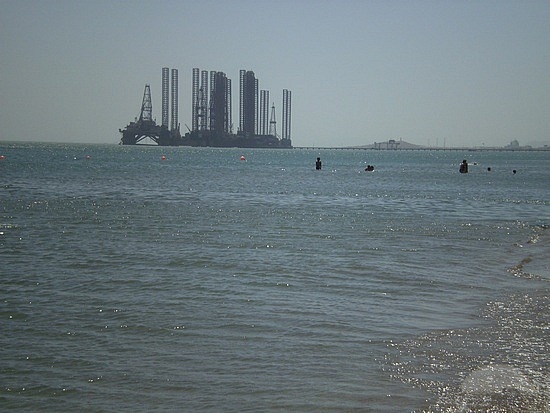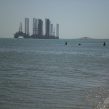
Caspian Legal Settlement Remains Elusive
Publication: Eurasia Daily Monitor Volume: 8 Issue: 226
By:

The Caspian nations have reiterated earlier promises to seek a consensus-based settlement, but they apparently failed to resolve their differences. As a result, the Caspian summit previously scheduled in Moscow, tentatively in November this year, appeared to remain elusive.
During a meeting in Astana on November 22-23, representatives of the five littoral countries, Azerbaijan, Kazakhstan, Iran, Russia and Turkmenistan, made yet another attempt to reach an agreement on the division of the Caspian Sea. The meeting of the working group was held in Astana in a bid to reach a consensus on a draft of the Caspian Convention, a legally-binding treaty to determine the future Caspian division, acceptable to all littoral states. The meeting started with optimistic pronouncements. Kazakhstan’s Foreign Minister, Yerzhan Kazykhanov, voiced confidence that differences between the Caspian littoral states can be settled. The Caspian Convention may be signed soon, he argued, but he did not elaborate (Interfax, November 22).
However, the differences between the littoral states did not take long to surface. Azerbaijan’s Caspian envoy, deputy foreign minister Khalaf Khalafov, insisted that Azerbaijan and Kazakhstan had a “sovereign right” to build a subsea Trans-Caspian gas pipeline (Interfax, November 23).
Subsequently, Russia conceded the Caspian settlement would require more time. Negotiations can take “quite a long time,” said the Russian envoy Alexander Golovin. A final text of the Caspian Convention is yet to be drafted, Golovin said, adding that the talks could require more than one year (Interfax, November 23).
Earlier this year, the Russian envoy sounded more optimistic. In April 2011, Golovin said the 4th Caspian Summit in Moscow was supposed to finalize the Convention in 2011. The official optimism apparently originated from the meeting in Baku on November 18, 2010, when Russian President Dmitry Medvedev stated that the Caspian summits should become an annual event. Iranian President Mahmoud Ahmadinejad told the summit the Caspian Convention should be adopted in 2011.
Following years of negotiations on the Caspian Convention, the littoral states remain divided on a variety of issues, notably subsea pipelines. And despite initial official optimistic pronouncements, diplomats revealed no time-frame for the Caspian summit that was planned to be held in Moscow in November 2011.
The Caspian Convention has been under discussion since 1991, and respective special Caspian envoys have been meeting since 1996. The first Caspian summit, held in Ashgabat in April 2002, did not adopt any agreements. The next Caspian summit was subjected to endless delays. It was originally expected in Tehran in the second half of 2004, but was held only in October 2007.
During the summit meeting in Baku on November 18, 2010, leaders of all five states signed an agreement on security cooperation. It stipulates that only the littoral states are responsible for Caspian security, while security cooperation could be carried out in bilateral and multilateral formats. On November 30, 2011, Medvedev signed into law a bill to ratify the Caspian security agreement. During the meeting in Astana on November 22-23, Russia’s Golovin complained that Moscow had drafted an agreement on sturgeon conservation, but other littoral states were slow to discuss it. Russia’s fishery agency tried to convene a meeting in Astrakhan and discuss the draft twice, in July and in September, but only Azerbaijan’s representatives attended, he said (Interfax, November 23).
Plans to introduce a five-year ban on the fishing of sturgeon were discussed at the summit meeting in Baku on November 18, 2010. On August 17, 2011, during a trip to Astrakhan, Medvedev urged the littoral states to introduce a temporary fishing ban in order to protect sturgeon. However, the meeting held in Aktau on August 10-12, failed to agree on where the Secretariat of the Tehran framework Convention on marine environment protection should be based. During this meeting, the littoral states signed the Convention’s protocol on regional preparedness to counter oil leaks, but did not agree on a protocol for environmental monitoring.
The littoral states appeared to be reluctant to discuss a relatively minor issue of sturgeon conservation, because marine environmental matters were directly connected with a major point of disagreement, the subsea pipelines. Russia has insisted that all major energy projects, posing environmental risks for the Caspian Sea, should be approved by a consensus among all littoral states. Moscow has consistently opposed the project for the US-backed under water pipeline across the Caspian Sea, citing environmental concerns.
Moscow also expressed its displeasure when the pipeline project received European support. On September 13, the Russian foreign ministry lashed out at what it described as the attempts at external interference in Caspian affairs. “We hope that the Council of Europe would take notice of the Russian position,” and refrain from meddling, the Russian foreign ministry spokesman Alexander Lukashevich said, referring to the European support of the Trans Caspian gas pipeline project.
In order to oppose the perceived foreign meddling in the Caspian region, Moscow seemed prepared to go as far as siding with Iran. On August 17, Russian Foreign Minister, Sergei Lavrov, announced that Moscow and Tehran had similar positions on the legal status of the Caspian. He also said both countries opposed any “outside pressures” (Interfax, August 17).
Simultaneously, Moscow also sent neighboring littoral states a reminder of its military might in the Caspian. In August, the Russian Caspian Flotilla staged naval exercises as part of Tsentr 2011. The drill, held at the Adanak site in Dagestan, involved 10 naval vessels and some 500 personnel.
Therefore, the latest talks between the Caspian envoys once again demonstrated difficulties in reaching a broad regional consensus. It remains to be seen whether the fourth Caspian summit could convene in Moscow any time soon as the littoral states apparently struggled to agree on the crucial issues of Caspian division.




